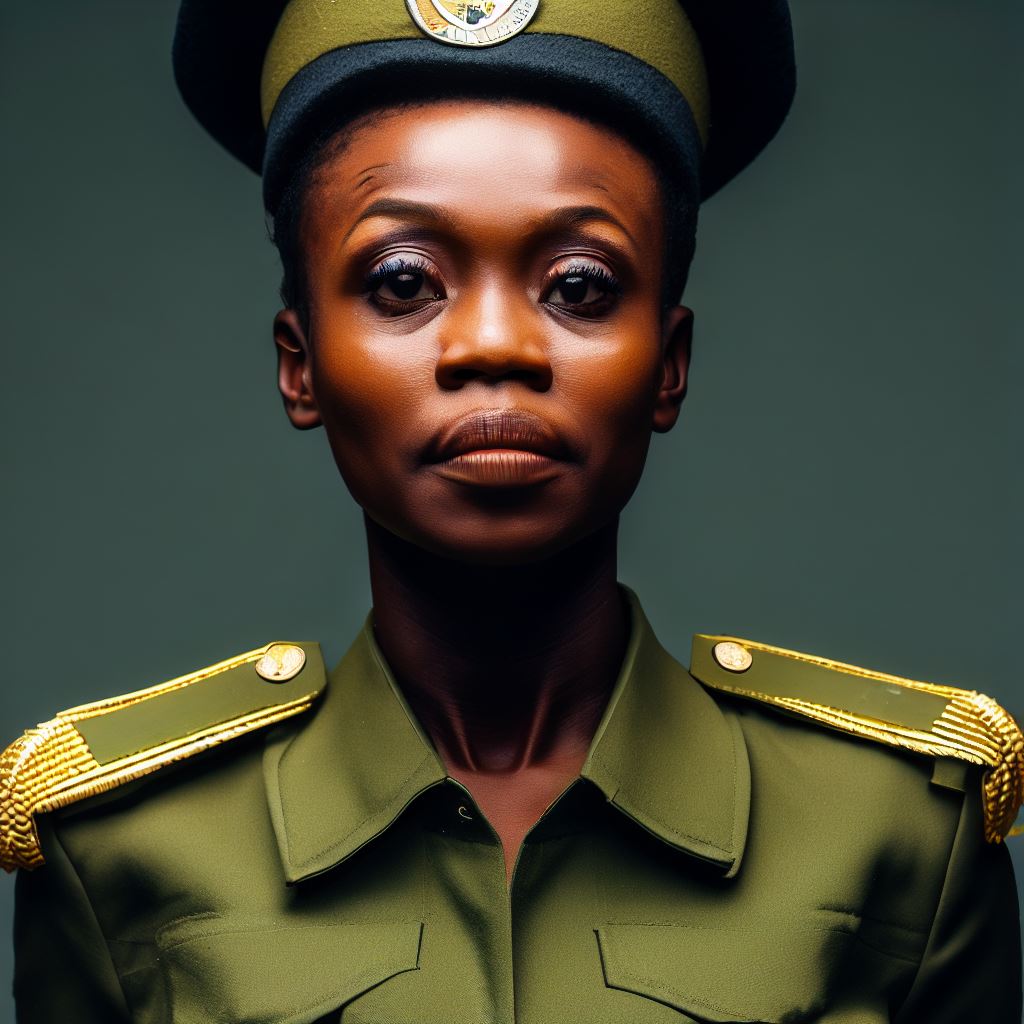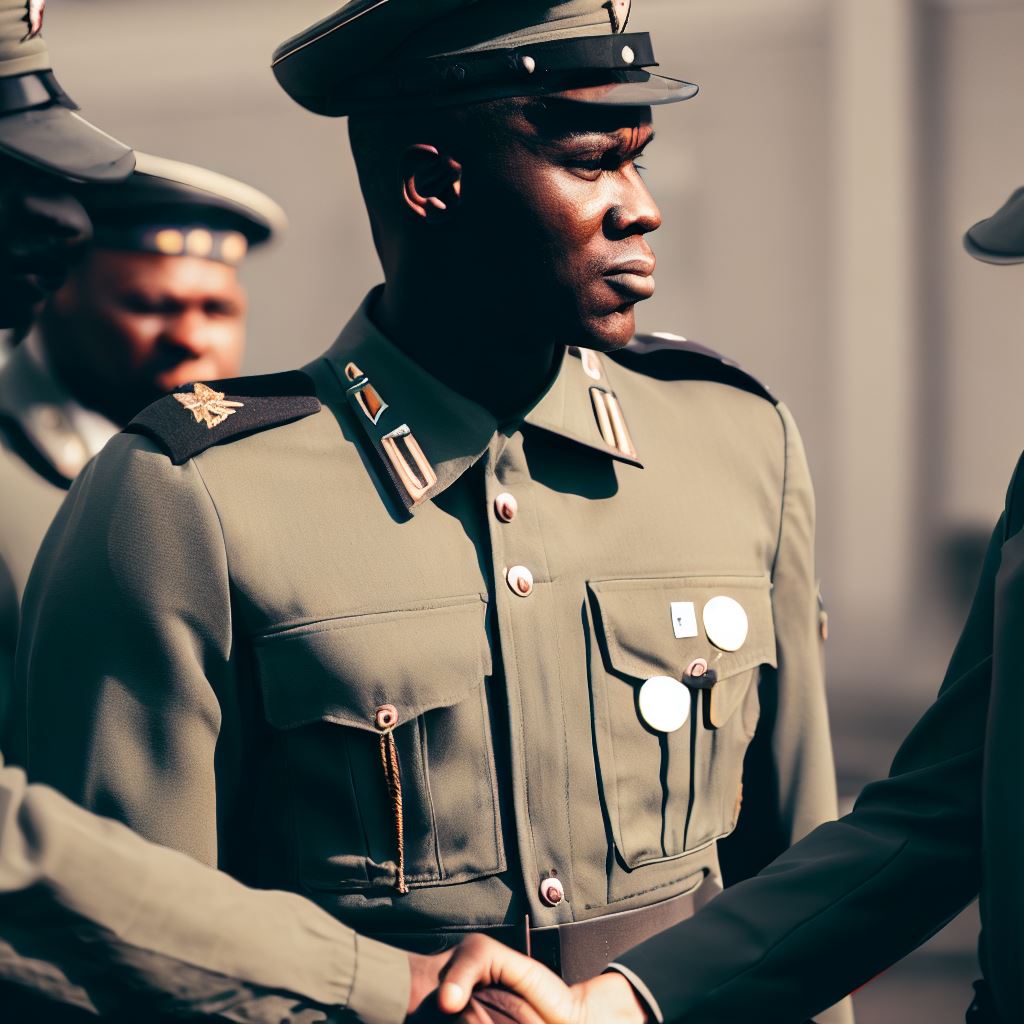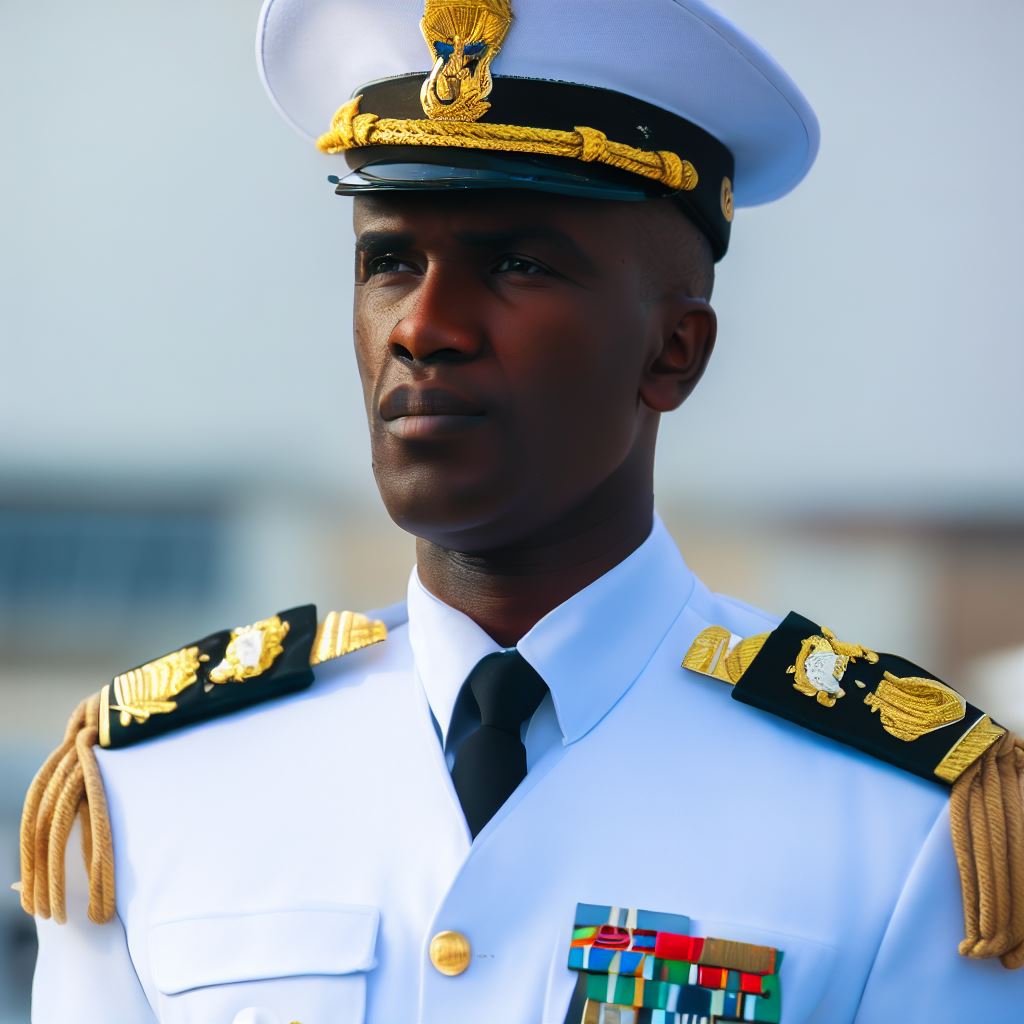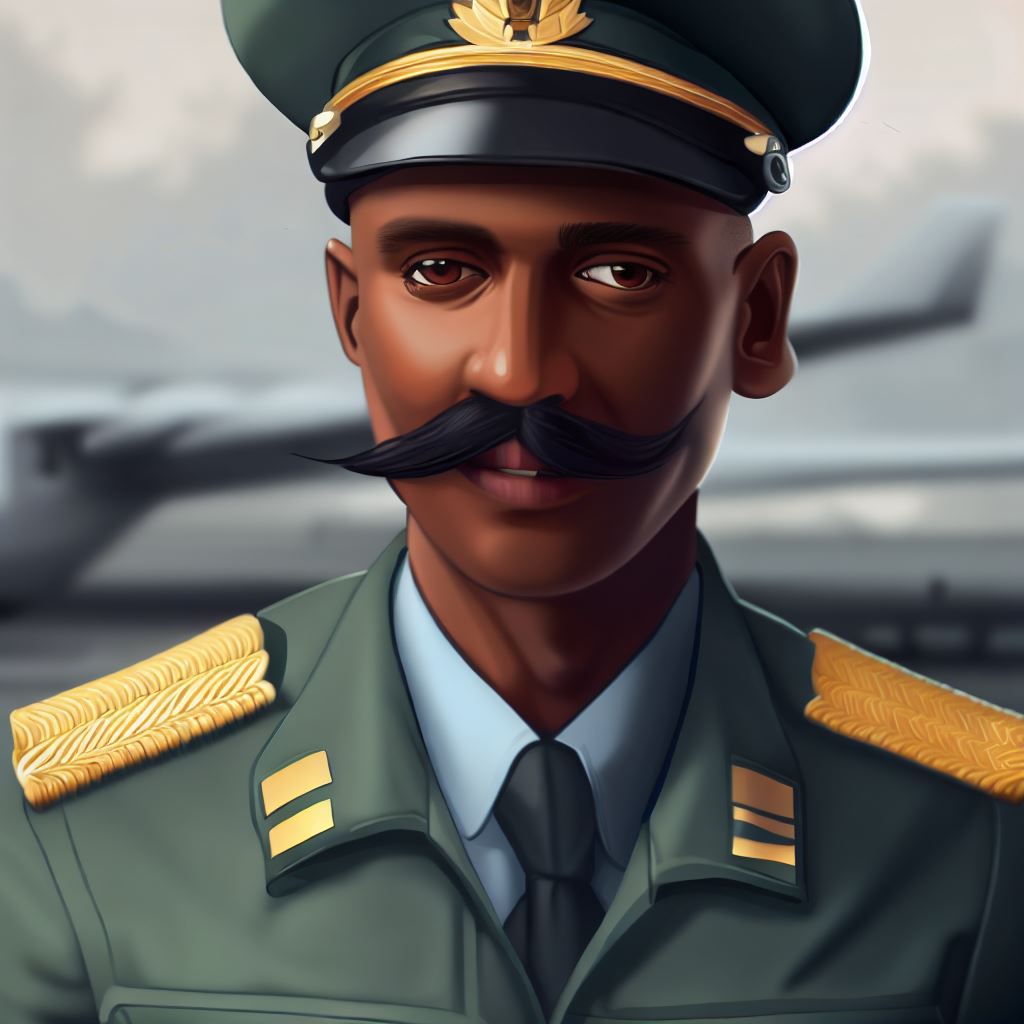Introduction
Leadership skills involve the ability to guide and inspire others towards a common goal. Leadership skills are crucial in the Nigeria Army for effective decision-making and mission success.
Being an officer in Nigeria’s Army requires a high level of discipline, dedication, and responsibility.
The Nigerian Army is a vital institution that serves to protect the nation’s sovereignty and ensure internal security.
Leaders within the army play a crucial role in achieving these objectives, as they possess the necessary skills to guide and inspire their subordinates.
Leadership skills encompass various qualities, including effective communication, strategic thinking, and the ability to motivate others.
These skills are essential for officers in the Nigerian Army as they are responsible for leading troops in various operations, maintaining discipline, and ensuring the successful completion of missions.
Being an officer in Nigeria’s Army is a position of great responsibility. It requires individuals to undergo rigorous training, both physical and mental, to prepare them for the challenges they may face.
Officers hold significant authority, making critical decisions that directly impact the lives of their subordinates and the success of the army.
Moreover, officers in Nigeria’s Army must exemplify the core values of loyalty, selfless service, and integrity. They are expected to lead by example, setting high moral standards for their subordinates to follow.
This not only strengthens the army, but also promotes a culture of professionalism and ethics within the organization.
In summary, leadership skills are vital in the Nigerian Army as they contribute to effective decision-making and mission success.
Being an officer in Nigeria’s Army carries great responsibility and requires individuals to possess the necessary qualities to lead and inspire others. It is a position that demands unwavering commitment, discipline, and dedication.
Background of Nigeria’s Army
Historical context of the Nigerian Army
The Nigerian Army can trace its roots back to the Royal West African Frontier Force, which was established in 1900 during the colonial period.
It later became the Nigerian Regiment of the Royal West African Frontier Force and the West African Frontier Force before independence in 1960.
The Nigerian Army has a rich historical context that dates back to the colonial period.
It was originally formed as the Royal West African Frontier Force in 1900 and underwent various name changes until Nigeria gained independence in 1960.
Today, it serves as the primary defense force of the country.
Purpose and objectives of the Nigerian Army
The purpose of the Nigerian Army is to defend the territorial integrity of Nigeria and protect its national interests.
Its objectives include maintaining peace and security, conducting military operations, and providing aid to civil authorities when necessary.
The purpose of the Nigerian Army is multifaceted. Its main objective is to defend Nigeria’s territorial integrity and protect its national interests.
This involves maintaining peace and security within the country and ensuring that Nigeria is not threatened by external forces.
Additionally, the Nigerian Army is responsible for conducting military operations and providing support to civil authorities in times of need.
Rank structure in the Nigerian Army
The rank structure in the Nigerian Army is modeled after the British Army, with commissioned officers and non-commissioned officers.
Commissioned officers hold ranks such as Lieutenant, Captain, Major, Colonel, Brigadier General, Major General, Lieutenant General, and General.
Non-commissioned officers hold ranks such as Lance Corporal, Corporal, Sergeant, Staff Sergeant, Warrant Officer Class 2, Warrant Officer Class 1, and Master Warrant Officer.
The rank structure within the Nigerian Army is hierarchical, following the tradition of the British Army.
Commissioned officers hold higher ranks and are responsible for commanding troops and overseeing operations.
These ranks include Lieutenant, Captain, Major, Colonel, Brigadier General, Major General, Lieutenant General, and General.
Non-commissioned officers play a crucial role in the Nigerian Army and hold ranks such as Lance Corporal, Corporal, Sergeant, Staff Sergeant, Warrant Officer Class 2, Warrant Officer Class 1, and Master Warrant Officer.
Understanding the historical context, purpose, and rank structure of the Nigerian Army is essential for anyone aspiring to become an officer in this prestigious institution.
It provides a foundation for building leadership skills and emphasizes the importance of upholding Nigeria’s national security and interests.
Read: Training at Nigeria Military Academies: A Guide
Qualities and Characteristics of Effective Leaders in the Nigerian Army
Competence and expertise in military operations
- Leaders in the Nigerian Army must possess a high level of competence and expertise in military operations.
- They should have a deep understanding of military tactics, strategies, and procedures.
- Leaders need to demonstrate their ability to effectively plan and execute operations.
- It is crucial for them to stay updated with the latest advancements in military technology and techniques.
- Effective leaders in the Nigerian Army are those who have proven their competence through successful missions.
Ability to make quick and decisive decisions
- Being able to make quick and decisive decisions is a vital quality for leaders in the Nigerian Army.
- In high-pressure and time-sensitive situations, leaders must analyze the available information and act promptly.
- Delaying decisions can have severe consequences and may put the lives of soldiers at risk.
- Effective leaders can assess the situation, consider various options, and make sound decisions without hesitation.
- Their ability to make quick and decisive decisions instills confidence in their subordinates.
Strong communication and interpersonal skills
- In the Nigerian Army, effective leaders must possess strong communication and interpersonal skills.
- They need to be able to clearly communicate their expectations and directives to their subordinates.
- Leaders must listen actively and maintain open lines of communication with their team.
- Building strong relationships with subordinates fosters trust, loyalty, and a sense of unity.
- Effective leaders encourage two-way communication and welcome feedback from their team members.
Adaptability and flexibility
- Leaders in the Nigerian Army must be adaptable and flexible to navigate through challenging situations.
- They should be able to adjust their plans and strategies when faced with unexpected circumstances.
- Adaptability allows leaders to respond effectively to changes in the operational environment.
- Flexibility enables leaders to consider alternative approaches and make necessary adjustments.
- Effectively adapting to new situations demonstrates leadership and enhances mission success.
Integrity and moral uprightness
- Integrity and moral uprightness are essential qualities for leaders in the Nigerian Army.
- Leaders must uphold high ethical standards and demonstrate honesty and transparency.
- They are expected to act with integrity, putting the well-being of their subordinates and the mission first.
- Effective leaders lead by example and inspire trust and respect among their team members.
- Integrity and moral uprightness are the foundation upon which leadership in the Nigerian Army is built.
Read: Women in Nigeria’s Military: Breaking Barriers
Training and Development of Leadership Skills in the Nigerian Army
Overview of the Nigerian Army officers’ training program
The Nigerian Army officers’ training program is a rigorous and comprehensive process aimed at developing effective leaders.
Importance of leadership training in the Nigerian Army
Leadership training is crucial in the Nigerian Army as it ensures officers are equipped with the necessary skills to lead and command troops effectively.
Areas of focus during leadership training
During leadership training, the Nigerian Army emphasizes various areas to enhance the officers’ capabilities.
- Tactical and operational leadership skills: Training focuses on developing officers’ abilities to lead and make quick decisions in high-pressure situations.
- Strategic and administrative leadership skills: Emphasis is placed on developing officers’ skills in planning, organizing, and managing resources efficiently.
- Ethical and moral leadership development: The Nigerian Army instills ethical values and moral principles to ensure officers lead with integrity and fairness.
- Team building and collaboration: Training promotes the importance of teamwork and effective collaboration among officers and their subordinates.
Overall, the Nigerian Army officers’ training program is designed to develop well-rounded leaders capable of fulfilling their roles effectively.
Read: Paths to Becoming a Military Officer in Nigeria

Challenges and Rewards of Being an Officer in Nigeria’s Army
Risk and sacrifice associated with military service
- Being an officer in Nigeria’s Army comes with great risks and sacrifices.
- Officers are often deployed to conflict zones and must be prepared to face danger.
- They put their lives on the line to protect the nation’s security and defend its citizens.
- Living in constant danger is a significant challenge that tests their courage and dedication.
- Officers must be mentally and physically prepared to endure the hardships of military service.
Emotional and psychological demands of leadership roles
- Leadership roles in the army require officers to make tough decisions that can impact lives.
- They carry the responsibility of commanding and guiding their subordinates through challenging situations.
- Being in charge of a team means managing the emotions and morale of the soldiers under their command.
- Officers often face stressful situations, witnessing violence and tragedy that can have a lasting emotional impact.
- They must develop resilience and the ability to cope with the psychological demands of their position.
Opportunities for personal and professional growth
- Becoming an officer in Nigeria’s Army provides numerous opportunities for personal and professional growth.
- Through training, officers acquire valuable skills such as leadership, strategic thinking, and problem-solving.
- They are constantly challenged to improve themselves and develop their abilities.
- Officers have access to various educational and career advancement programs.
- They can pursue advanced military training and further their knowledge in specialized fields.
Honor and recognition received by officers
- Serving as an officer in Nigeria’s Army is a position of honor and brings recognition.
- Officers are respected for their commitment to serving their country and protecting its people.
- They are admired for their bravery and leadership skills.
- Within the military community, officers are held in high regard and seen as role models.
- Their dedication is acknowledged through awards, medals, and promotions.
Impact on national security and defense
- Being an officer in Nigeria’s Army means contributing directly to national security and defense.
- Officers are at the forefront of protecting the country’s borders and maintaining peace within its territory.
- Their actions and decisions impact the overall effectiveness of the military’s operations.
- Their leadership and strategic thinking skills are crucial for maintaining a strong defense system.
- By serving in the army, officers play a vital role in safeguarding Nigeria and its citizens.
Being an officer in Nigeria’s Army is a challenging and rewarding role. It requires individuals to face risks and make sacrifices for the greater good.
They must handle the emotional and psychological demands of leadership, while also seizing opportunities for personal and professional growth.
The honor and recognition they receive, along with their impact on national security and defense, make their service invaluable to the nation.
Read: Military Officer Ranks in Nigeria: A Comprehensive List
Examples of Nigerian Army Officers Who Demonstrated Exceptional Leadership Skills
General Tukur Yusufu Buratai – former Chief of Army Staff
General Tukur Yusufu Buratai is widely recognized for his exceptional leadership skills during his tenure as the Chief of Army Staff in Nigeria.
He exhibited profound dedication and commitment to the welfare and success of the Nigerian Army.
One remarkable quality displayed by General Buratai was his ability to inspire and motivate his subordinates.
He believed in leading by example, often taking an active part in military operations and instilling a strong sense of duty in his soldiers.
Throughout his career, he demonstrated excellent strategic thinking, making well-informed decisions that enhanced the effectiveness of the Nigerian Army.
General Buratai played a significant role in the fight against insurgency and terrorism, implementing innovative tactics that yielded positive results.
Moreover, General Buratai prioritized the training and professional development of soldiers under his command.
He emphasized the importance of continuous learning, regularly organizing workshops and seminars to enhance the skills and knowledge of Nigerian officers and soldiers.
Under his leadership, the Nigerian Army witnessed significant improvements in discipline and operational standards.
He implemented strict measures to eradicate corruption and foster a culture of accountability and transparency within the ranks.
Lieutenant General Ibrahim Attahiru – late Chief of Army Staff
Lieutenant General Ibrahim Attahiru was an exceptional Nigerian Army officer who served as the Chief of Army Staff until his unfortunate demise.
He showcased exemplary leadership skills and a deep commitment to upholding the values of the Nigerian Army.
General Attahiru possessed exceptional tactical proficiency, which he demonstrated during various military operations.
His ability to analyze complex situations and develop effective strategies greatly contributed to the success of critical missions.
Additionally, General Attahiru had excellent communication skills, fostering an environment of open dialogue and effective teamwork.
He ensured that information flowed freely within the ranks, enabling subordinates to make informed decisions in real-time.
He further prioritized the welfare of his soldiers, paying utmost attention to their physical and mental well-being.
General Attahiru implemented welfare programs and initiatives that catered to the needs of soldiers and improved their overall quality of life.
Furthermore, he promoted inclusivity and diversity within the Nigerian Army, recognizing the value of a multicultural and inclusive workforce.
General Attahiru actively encouraged women participation in the armed forces, aiming for a more balanced and representative military.
Major General Benjamin Ahanotu – Commander, Training and Doctrine Command
Major General Benjamin Ahanotu is a notable Nigerian Army officer who currently holds the position of Commander in the Training and Doctrine Command.
He has exemplified exceptional leadership skills throughout his career.
As Commander, he has focused on enhancing the training and development of Nigerian Army personnel.
Major General Ahanotu has introduced innovative training techniques and programs, ensuring that soldiers are well-equipped to face contemporary security challenges.
He has also emphasized the importance of incorporating technology and modern warfare strategies into training regimens.
This approach has enhanced the overall operational readiness of the Nigerian Army and enabled them to adapt to rapidly evolving security threats.
Additionally, Major General Ahanotu has placed great emphasis on ethical conduct and professionalism within the Nigerian Army.
He has actively sought to eliminate any form of indiscipline or misconduct, instilling a strong sense of discipline and integrity within the ranks.
Major General Olusegun Adeniyi – former Theatre Commander, Operation Lafiya Dole
Major General Olusegun Adeniyi, during his tenure as the Theatre Commander of Operation Lafiya Dole, demonstrated exceptional leadership skills and contributed significantly to the fight against insurgency in Nigeria.
He displayed exceptional operational competence, effectively coordinating military operations against Boko Haram.
Major General Adeniyi’s strategic thinking and ability to adapt to changing circumstances greatly contributed to the success of various operations.
Moreover, he prioritized the welfare of his troops and ensured their well-being amidst challenging conditions.
Major General Adeniyi provided necessary support and resources, fostering morale and instilling a sense of camaraderie among soldiers under his command.
He also emphasized the importance of civil-military relations, working closely with local communities to gain their support and trust.
Major General Adeniyi recognized the significance of partnerships in countering insurgency and actively engaged with various stakeholders to achieve common goals.
In a nutshell, the Nigerian Army has been fortunate to have exceptional leaders such as General Tukur Yusufu Buratai, Lieutenant General Ibrahim Attahiru, Major General Benjamin Ahanotu, and Major General Olusegun Adeniyi.
Through their stellar leadership skills, they have not only enhanced the capabilities of the Nigerian Army but also established a benchmark for future officers to follow.
Their dedication and commitment serve as an inspiration to both current and aspiring army officers in Nigeria.
Conclusion
Leadership skills play a crucial role in the Nigerian Army, as they determine the success of operations and the well-being of troops.
If you have a passion for serving your country and leading others, consider joining the Nigerian Army and honing your leadership skills.
Officers in the Nigerian Army are vital for maintaining national security and promoting development. Their leadership is essential in preserving peace and stability in our nation.




